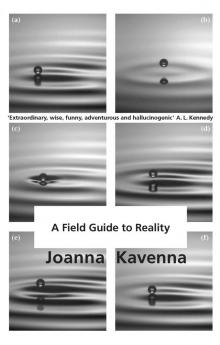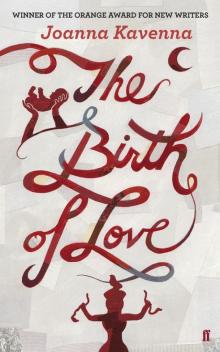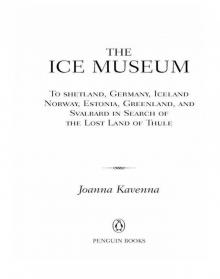- Home
- Joanna Kavenna
A Field Guide to Reality
A Field Guide to Reality Read online
Table of Contents
Cover Page
Title Page
Copyright Page
About the Author
Author note
Dedication
Dramatis Personæ
Prologue
I The Chronicler of Alhazen
II A Field Guide to Reality
III The Tradescantian Ark
IV Boomerang Prophecies
V The Celestial Pinecone
VI Hypatia of Alexandria
VII The Mechanical Magicians
VIII The Society of the Universal Chrysanthemum
IX On the Nature of Shadows
X Priests of the Quantum Realm
XI Ψ
XII The Rainbow and The Halo
Epilogue
Acknowledgements
First published in Great Britain in 2016 by Riverrun
This edition first published in 2016 by
Quercus Editions Limited
Carmelite House
50 Victoria Embankment
London EC4Y ODZ
Copyright © 2016 Joanna Kavenna
Illustrations © 2016 Oly Ralfe
The moral right of Joanna Kavenna to be identified as the author of this work has been asserted in accordance with the Copyright, Designs and Patents Act, 1988.
All rights reserved. No part of this publication may be reproduced or transmitted in any form or by any means, electronic or mechanical, including photocopy, recording, or any information storage and retrieval system, without permission in writing from the publisher.
A CIP catalogue record for this book is available from the British Library
Ebook ISBN 978 1 7842 9311 6
Print ISBN 978 1 7808 7229 2
This book is a work of fiction. Names, characters, businesses, organizations, places and events are either the product of the author’s imagination or are used fictitiously. Any resemblance to actual persons, living or dead, events or locales is entirely coincidental.
You can find this and many other great books at:
riverrunbooks.co.uk
Joanna Kavenna is the author of The Ice Museum, Inglorious (which won the Orange Prize for New Writing), The Birth of Love, Come to the Edge and A Field Guide to Reality. Her writing has appeared in the New Yorker, Guardian, Observer, Telegraph, Spectator, London Review of Books and New York Times and she has held writing fellowships at St Antony’s College Oxford and St John’s College Cambridge. In 2011 she was named as one of the Telegraph’s 20 Writers Under 40 and in 2013 was listed as one of Granta’s Best of Young British Novelists. She lives in Oxfordshire.
Oly Ralfe is an artist, film-maker and musician. He collaborated with The Mighty Boosh and has recorded four music albums as Ralfe Band, including the soundtrack to the film Bunny and the Bull. His documentary films and music videos have won several awards.
This book may at times bear some relation to the historical facts
. . .
This is invariably coincidental
. . .
In Memory of
DMG (1945–2014)
and
CPR (1943–2015)
ATQUE IN PERPETUUM
. . .
AVE ATQUE VALE
Dramatis Personæ
Plato (c. 429–c. 347 BC)
Ironist, chatterbox, inventor of Socrates.
Aristotle (384–322 BC)
Obsessive list-maker, had the ear of a great king.
Robert Grosseteste (c. 1175–1253)
Futurologist, wizard, mind-bender.
Roger Bacon (c. 1214–1294)
Faustian sorcerer, conversed with devils.
Alhazen (c. 965–1040)
Arabian scholar, declared himself mad. Observed flying dust.
Lydia Cassavetes (1975—)
Archivist of Hypatia.
Hypatia (c. 350–415)
Neoplatonist, genius. Murdered by a Christian mob.
Barnes Martin (date of birth unknown)
Alchemist. Possibly the Comte de St Germain.
Or Fulcanelli.
Isaac Newton (1642–1727)
Called himself Jehovah, the Holy One. Occultist.
Iris McConnell (1980—)
Believes that the present does not exist.
John Locke (1632–1704)
Argued that we are inherently blank.
Lord Priddy (date of birth unknown)
Fan of psychotropic drugs and cricket.
Caspar Overson (1958—)
Believes that everything must be more Ψ.
Albert Einstein (1879–1955)
Found that reality remained mysterious, despite everything.
On 23 January 1216, a double rainbow is seen on Port Meadow, Oxford. It is formed of two vast arches, which span the sky. The feet of the arches are planted at the centre of the meadow, and rise beyond the medieval town. The colours are perfectly rendered: the brightness is overwhelming.
At this time, in line with the teachings of Aristotle, it is believed that rainbows derive from the reflection, by clouds, of the sun. The colours are caused by the dimming effect of clouds.
Gazing at the rainbow, people are in raptures and generally believe that God has presented them with a sign.
After the flood, God sent a rainbow to Noah, as a sign that humanity was forgiven.
There has been no flood, though this city is surrounded by water. Two rivers circumnavigate the place, and merge to the south.
Whispers emanate across the meadow marsh . . .
If this is a sign, then what does it mean?
Life in thirteenth-century Oxford is hard and dangerous. The homicide rate exceeds modern-day Bogota. Each year for every hundred monks attending the university (all students must be in religious orders), three are murdered, fifteen die of dysentery, and twenty-six run away to London.
The gates of the town close at dusk.
*
Walter Raleigh has not yet visited the New World and there are no potatoes or tobacco. The staple foods are bread, porridge and gruel. Meat is expensive and only the rich are assured of a reliable supply. Because of the Eucharist, bread is endowed with particular status and is consumed regularly, incessantly –
With deleterious physical effects and perhaps to the general despond of all:
MENU PRIX FIXE
STARTER:
Bread
MAIN:
Parsimonious cuts of meat with Ample Bread
DESSERT:
Bread Pudding
The sallow streets of medieval Oxford are riddled with people in varying states of acute and even chronic indigestion, trying to walk off the latest incursion of
Bread
As the first Chancellor of the university, Robert Grosse-teste presides over a series of monastic Halls –
Worm Hall
Cat Hall
Bull Hall
Hare Hall
Unicorn Hall
Woodcock Hall
Nightingale Hall
Eagle Hall
Sparrow Hall
Hawk Hall
Ape Hall
Beefe Hall
Perilous Hall
Kepeharm Hall
Aristotle Hall
Nun’s Hall
Pie Hall
Grosseteste is also known as Grossteste, Grostest, Grostet, Grosthead, Grouthead, Grostede, Greatheade, Grosteheved, Greateheved, Grosehede, Grokede, and Goschede. In this era, spellings are not fixed and the creative possibilities are endless. Yet Grosseteste of the mutable and at times suggestive name has more pressing matters to deal with. He is transfixed by mysteries. How do we see what we see? How do we know that what we see is real? Besides, he cannot fix himself in time. He ricoche
ts from one continent to another, across the centuries. He wonders at times if he is mad.
The eye is a lantern, says Empedocles the Greek and Grosseteste tries to catch the rest of his words . . .
As when a man, thinking to go out into the wintry night, makes ready a light, a flame of blazing fire . . .
Now Grosseteste sees Plato, surrounded by students and acolytes. Plato is explaining that light is a mixture of the inner fire of the eye, and the fire of the sun . . . The fire within us, which is akin to the daylight, flows pure, smooth and dense through the eyes . . .
This coalesces with daylight, says Plato, to form one uniform body . . . Its uniformity becomes sympathetic . . .
Grosseteste hides in the shade of an olive tree, he watches the people watching Plato. And even as he falters on the brink of a further realisation – he moves again, drifts through a few brief ages and now he is at the Lyceum with Aristotle.
Aristotle says: the eye does not emit light, instead light enters the eye from the world beyond.
The eye is Not a torch, a burning brand, striking the world with its radiant light. Plato’s theories are ludicrous.
The acolytes shift, they are uncertain.
Aristotle looks up – he sees Grosseteste nodding in the shadows – he is moving towards the cleric when – dark clouds obliterate the sun. Darkness spreads across the strange dream of Robert Grosseteste and the sky turns black, the DARK AGES are upon him.
This always happens, Grosseteste remembers, just when Aristotle is on the verge of speaking to him –
The mind cannot imagine such a prospect – he wonders –
And in the darkness he wonders if he is dying –
When dawn breaks, Grosseteste finds he is in Cairo. It is the eleventh century.
Though he is a metaphysical wraith, he sweats.
The city is kiln-hot, the streets are fired by a harsh sun.
Grosseteste hurries from one shadow to another.
Sunlight glares onto the white houses.
Horses clatter past him. And everything is swirled around in dust that blows in from the desert.
*
Ibn al-Haytham, known to posterity as Alhazen, is under house arrest. He was recently employed by Al-Hākim bi Amr Allāh, sixth ruler of the Fatimid caliphate, to control the flooding of the Nile. After a relatively short period of enquiry, it became quite apparent that Alhazen could not, in any discernible sense, achieve this task. As Al-Hākim was not renowned for his forgiving nature, Alhazen was forced to proclaim himself Mad. The defence saved his life, and yet now he is confined to his house. He can no longer ride across the desert at twilight, observing the rising of the silver moon. He can no longer venture to Mesopotamia, where he studied Aristotle in his youth. Despite such physical limitations, Alhazen embarks upon a Quest For Truth . . .
In a dark room – light that enters through HOLES is visible in the Dust that Fills the Air –
With these layers of shining dust, Alhazen tries to prove that light travels in straight lines only.
In this City of Dust, there are ample opportunities for Alhazen to test his theory . . .
In the dust storms that choke . . .
The dust that drifts onto the pages as Alhazen writes –
Dust sparkling like diamonds.
Beyond, the smoke, dreams, the dead swirling, the clouds and dust, ashes, the lights that flame and glitter in the skies.
Robert Grosseteste considers the dust that floats in the air and renders light visible –
*
Is Light a material substance? says Grosseteste to himself. Ages have passed around him and he has drifted back to Oxford. His mind is addled today and his stomach aches. The sky is deep and swart. In this hall, they choose between warmth and light; there is no glass across the window.
Draughts oppress him, make him cough and shiver.
Though his room is filled with pale light, though the lighted dust swirls, he tries to remember –
A dream of light?
Grosseteste presents an epistemology of light, a metaphysics of light, an etiology of light, and a theology of light. He describes the birth of the universe in an explosion, and a further crystallisation of matter. All creation emerges from an expanding – and contracting – sphere of light.
And the Lord said, ‘Let there be Light!’
*
A few days or aeons later, Grosseteste is at dinner again. He abhors the draughts that swirl through the echoing hall. The monks sit quietly except for Grosseteste and his companions at the highest table, who are arguing –
Hunger, weariness, general fret and besides they do not agree about Universals –
The company includes:
Roger Bacon – The Marvellous Doctor
Adam Marsh – The Illustrious Doctor
John Duns Scotus – The Subtle Doctor
William of Ockham – The Invincible Doctor
Dining, alas, on bread.
In this shadowy echoing hall –
Roger Bacon explains –
How gunpowder might be created
The possibility of a flying machine
How to design a magnifying glass
Bacon, too, is transfixed by the mysteries of light, and perception, and how the eye sees anything at all. He has created, he suggests, a strange device which displays shadows against a wall. When Bacon first presents his spectacle of light and shade he terrifies his audience. Figures leer, gargantuan, menacing – the crowd shuffles backwards, screams.
As night falls, Bacon walks through the streets and scarcely notices the shifty cut-throats emerging from the shadows. He looks at the darkening sky and remembers the Islamic scholar Al-Kindi, who thought that every creature in the universe is a source of radiation and the universe itself a vast network of forces. These forces, or species, are often not visible. But light is.
Thus, Bacon realises, Light is the most extraordinary and most intriguing of all realities, because it is as if the Wind became visible. Or, as if Thought streamed in colours across the sky.
For his scholarly pursuits and unrivalled experimentation, Bacon is quite naturally accused of necromancy and consorting with the Devil . . . In this he joins a long line of visionaries accused by their enemies of treachery or heresy –
*
Socrates, disposed of by a state that found him profoundly irritating . . .
Boethius, who was imprisoned and later murdered by King Theodric the Great . . .
Galileo Galilei, oppressed and silenced by the Church . . .
Countless unknown wise women, drowned or burnt.
*
Also at dinner is John Duns Scotus who produces rigorous and munificent works of learning until he is accidentally buried alive.
His servant, who is fully aware that Duns Scotus has a tendency to catatonia, is unfortunately absent when his master collapses and doctors are summoned. Thus Duns Scotus is pronounced dead, and cast into the ground . . .
*
Later, William of Ockham –
The Invincible Doctor –
explains that mathematical entities are Not Real –
and lends his name to the notion of Occam’s Razor. Put simply, this is the proposition that the Simplest Theory is the Best.
But THEN
William of Ockham creates a Massive Cataclysm . . .
In his dream, Grosseteste stirs, and calls out NO NO – he foresees the schism, he can hardly prevent it.
Ideas will flow and spawn new ideas and then –
*
Ockham is sitting in another cold Oxford hall. A fire flickering in the grate, shadows dancing on the walls. It is 1321.
He has read Grosseteste’s work and the works of Roger Bacon, and Duns Scotus, the buried man, and he has mused liberally on the questions of:
*
How do we know what it is that we See?
And does perception create the world, or is it there before us, present and perpetual?
*
&
nbsp; When the realisation comes, Ockham is so shocked, he clasps his hands to his ears, hoping thereby he might deafen himself to his own thoughts.
He begins to tremble –
METAPHYSICAL UNIVERSALS ARE NOT REAL
These abstracts, all the forms of Plato, the grandiose notion that there are universal versions of each flawed aspect of the mortal world, the universal forms of Light –
Do not Exist.
*
A scene of general horror at the Great Table as the scholars pause, knives aloft –
*
William of Ockham denies that there are perpetual elements that unify all creation . . .
Instead he believes –
That everything is unlike everything else, and there can be no synthesis . . .
(Except – he says, nervously, with an eye on the Pope – In God.)
The Pope excommunicates him anyway . . .
Threadbare and no longer quite as invincible as before, Ockham devotes himself to scholarship.
(And calls the Pope a heretic.)
No universals.
No whole.
Reality changes . . .
Many centuries later it was 2016 and I was a few decades into my current lifespan. I was spending my time in Oxford. There are many worse places. Conditions had significantly improved since the thirteenth century and the trials of Grosseteste. Bread was still abundant, but was now treated with suspicion, as a decadent substance. On these grounds, some people refused even to consume it. The city was glinting and prosperous. Great lines of traffic snaked across the bridges, passing beneath the spires and gargoyles. The north of the city, mere pastureland at the time of Grosseteste, was now full of Victorian mansions, overlooked by further gargoyles, in architectural homage to vanished ages. Intended originally as family accommodation for married dons, they were now owned by stockbrokers and bankers, interspersed with a few oligarchs and former tyrants.
I lived in a small rented room in a little house in East Oxford, the workers’ regions of the nineteenth-century city, now colonised by students and by all those dons who could no longer afford to live in the North. I was neither a student, nor a don; I worked in a café and occasionally did some research work at the university. In the evenings I sat in the Great Library, another significant medieval edifice, and studied the history of the city. When I arrived back at my small rented room, and slept, the words I had read that evening informed my dreams, taking me back to dusty Cairo and even to the mud-plains of medieval Oxford. The hawkers and criminals, waiting with their knives. I was biting my hands and shouting when I woke. The walls of my room were thin and I could hear my landlady moving around, the floorboards creaking under her feet.

 A Field Guide to Reality
A Field Guide to Reality Inglorious
Inglorious The Birth of Love
The Birth of Love The Ice Museum
The Ice Museum